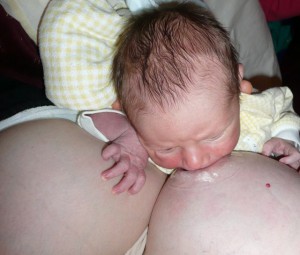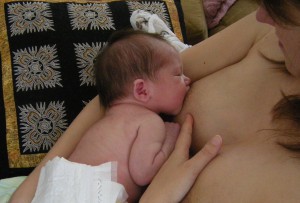A new mother called me last week worried about her baby. He was struggling with latching and seemed generally unhappy with breastfeeding. She was terribly engorged and in a tremendous amount of pain from childbirth as well as her breast and nipple pain. When I arrived she was teary, confused and doubting her abilities as a mother.

Engorged breasts and nipple shields
In the process of hearing her story, I learned that she had been told several times by nurses and doctors that it was important to pump after each feeding to make sure the milk would come in. She was also told to feed her baby every 1.5 to 2 hours day and night. . She wanted to do everything right. She wanted to make sure her tiny newborn got plenty to eat.
So she did as she was told. When he was too sleepy (or too full) to wake up, she called her pediatrician. How could she feed her baby when he wouldn’t wake up? As per his advice, she stripped him to his diaper, tickled his feet and used cool washcloths when necessary. She continued to pump after feedings—terrified that her baby was not getting enough to eat. She even hand-expressed milk into his mouth—so worried he wasn’t eating enough. She was also concerned about her baby’s very frequent, mucousy stools.
Unfortunately, no one had bothered to ask about her health history. If they had, they would know she had a late miscarriage a few years prior. They would have known that after the miscarriage she had a full milk supply for several weeks and had a terrible time with engorgement. They would also have know that she has PCOS—which can result in copious milk supply. (Mom’s with PCOS can also have issues with low milk supply.)
When her milk came in she was in trouble. She felt she had to keep pumping because she had so much milk. Her baby was choking and gagging. He would only nurse for 3-5 minutes–and it was a struggle. Then she would pump 6 additional ounces!
I showed her how to help her baby to the breast, letting him “take the lead” and latch in a way that worked with his reflexes. He nursed beautifully through her strong let down and handled her supply with no trouble. When the milk came too quickly, he cleverly let go and she helped him regroup and burp a little. He ended up nursing on both breasts contentedly for about 15 minutes. When he decided he was full, he was relaxed and happy. His mother was amazed at the difference!
I saw this mom a week later and she was a new woman. Now she lets her baby decide when he wants to eat. She used cabbage leaves to reduce her swelling and milk production and stopped pumping after feedings. Her baby’s stools are normal and he is happy and growing well.
If you find yourself with an oversupply brought on by pumping, gradually decrease the pumping over time. Cabbage leaves (green) rinsed and placed under your bra a few times/day will help reduce engorgement and may reduce your supply somewhat. Some foods may help you reduce supply as well. Your baby may be more comfortable nursing side by side in bed. You can also try leaning back and letting your baby nurse prone.
Many mothers worry about not having enough milk. It’s natural for a you, as a new mom, to have doubts. But try to keep in mind that the vast majority of mammals—including humans– have plenty of milk for their babies. It’s relatively rare to be unable to produce adequate milk. If you feel you have too little milk, or too much, please contact a lactation consultant and get help as soon as possible. The sooner you get help, the sooner you can relax and enjoy your baby and breastfeeding.



